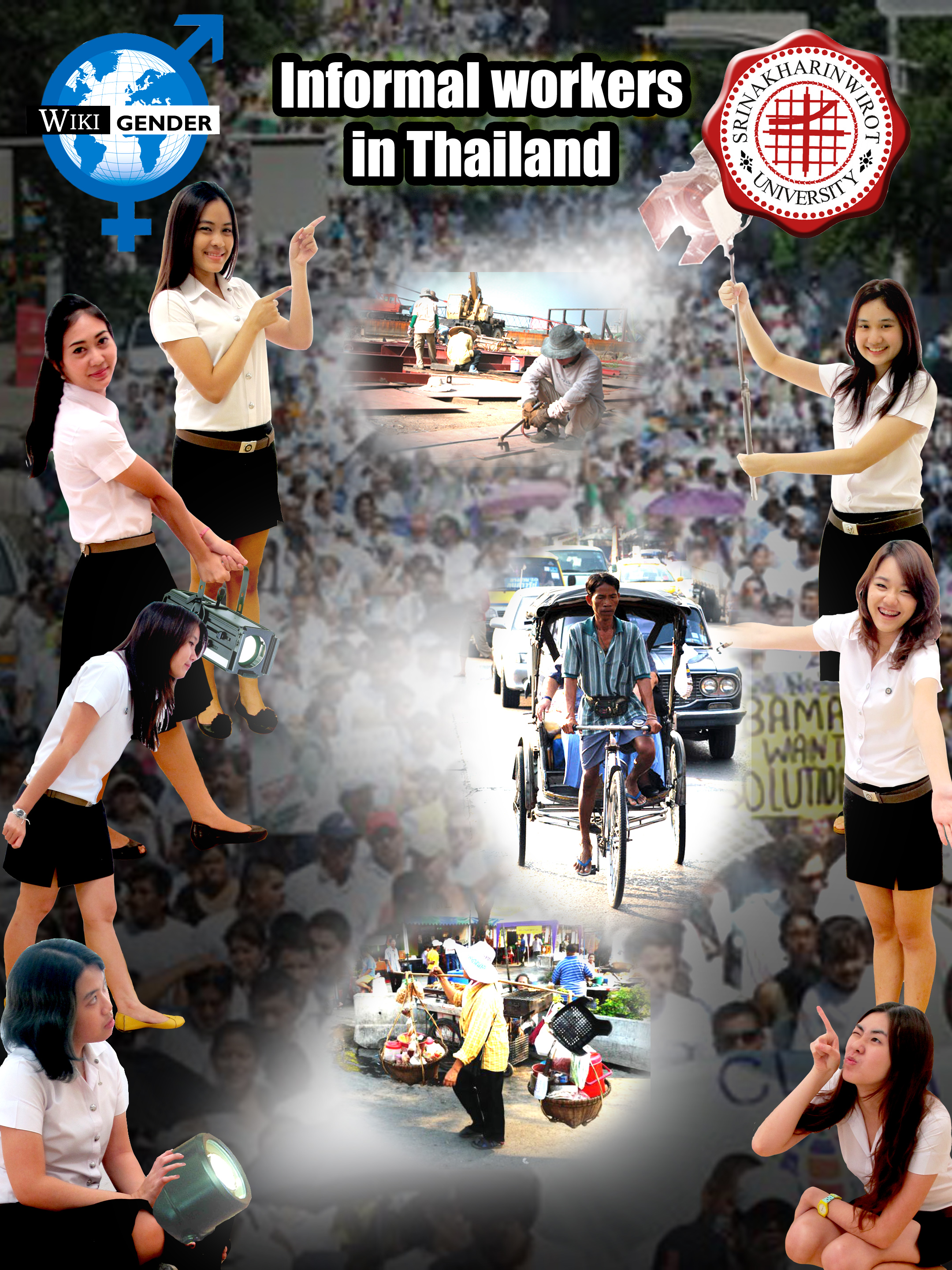Informal workers in Thailand

This article was written by Group 12 in , as part of the .
Informal workers in Thailand

Informal workers are those who work with no official contract arrangement.foundation for Labour and Employment Promotion,(2012).Informal workers It could also concern those whose employers do not respect the labour legislation.Uber Digests,(2011).What is Labor Legislation?Retrived August 1, 2011 This kind of employment does not guarantee remuneration. Common types of informal workers are home-based workers, industrial outworkers, temporary workersTutor2u.Employing temporary workers and part-time workers.
Since the information about informal workers does not exist, they are likely to become invisible labour forces and are subject to unfair employment terms, a lack of stable income, and a lack of labour protection and social security. Having the least power to deal with such associated risks, they are also more likely to be faced with such risks than formal workers.
In general, informal workers can be divided in 3 main categories:
- Informal workers in the production sector (working or producing from home). This group includes home-based workers or subcontracted workers. Employers who want to cut down on production costs to better compete in the free market often employ such labour.
- Informal workers in the service sector (employees, restaurant waiters/waitresses, motorcycle taxi drivers and taxi drivers).
- Informal workers in the agricultural sector (employees in the agricultural sector and contract farmers).
Problems facing informal workers
Invisibility:
- They are likely to become invisible labour forces and are subject to unfair employment terms, a lack of stable income, and a lack of labour protection and social security.
Informal workers enjoy no benefits from the labour protection laws :
- Since almost all existing laws provide only benefits for formal workers, informal workers are basically excluded.
Unfair wages and unstable income:
- Most informal workers are actually not paid minimum wages and do not have a stable income.
A lack of access to social security:
- They have no security contingency to address their needs such as illness, disability, accident or death.
A lack of organisation, representation, and bargaining power:
- They are not aware of their rights as workers and therefore they have no power to bargain with the employers and relevant state agencies.
Suffering from health and unsafe working environment:
- They lack occupational safety working conditions and knowledge of health issues.
The Japan International Labor Foundation
The supporting organisation of informal workers in Thailand is “The Japan International Labor Foundation” (JILAF).JILAF.Japan International Labor Foundation JILAF was established by RENGO (The Japanese Trade Union Confederation) in May 1989 as an organisation to promote international exchange and cooperation in the field of labour. During the 20 years since its establishment, JILAF has developed projects in cooperation with RENGO, affiliated members of RENGO, Local RENGOs, and the related government ministries and agencies, as well as the International Trade Union Confederation (ITUC), regional organisations, national centers of each country and others. From now on, JILAF will continue its activities with the aim of promoting the development of free democratic, independent trade unions, sound social and economic development in developing countries.
ILAF’s mission is to contribute to the economic and social development of developing countries through its support for free, democratic, and independent trade unions. As part of this mission, JILAF organises field projects in which unions in developing countries take the initiative in planning and operation. These projects are implemented in accordance with the environment surrounding local workers, unions necessity, worker education activities and social development activities. Local unions carry out activities to educate union leaders and union members, including “positive” seminars to improve the workplace environment, collective bargaining and labour agreement seminars, women’s seminars, basic trade union education seminars, seminars to foster union leaders, and capacity-building seminars. Social development activities are implemented by unions in the local community with the aim of contributing to the community through them. The main program is a school project for the eradication of child labour. While emphasising the independence, continuity, and responsibility of local unions in implementing these projects, JILAF dispatches instructors, supplies know-how, and provides financial support. Field Projects began in FY 1994. Seminars and workshops have been held in 19 countries.
JILAF is currently implementing the “Supporting Grass-roots Activities through the International Employers’ and Workers’ Network” (SGRA) project, a project launched by the Japanese Ministry of Health, Labor and Welfare (MHLW), in Thailand. This project provides assistance to people and their families who are in socially unstable and vulnerable positions in developing countries, such as informal sector workers, low-wage earners, women, people with disabilities, etc., by utilising the international employers’ and workers’ networks. JILAF has set up its local SGRA offices based in Thailand and Nepal for this project.
In Thailand, activities centered on the supply of information are implemented with the aim of improving the lives of informal workers. Labour-management network and livelihood-support seminars are held for informal workers and their family members. These seminars also contribute to network building among the informal workers themselves.
In the livelihood-support seminars, information is provided on the social security system, household budget improvement, safety and health, and the mutual-aid system. The project is implemented at five places in the four regions of Bangkok, Nonthaburi, Samut Prakan and Chiang Mai.
Women informal workersIsis International,(2006).Thailand’s Working Class WomenRetrieve 2 October 2006
According to a survey by the National Statistical Office, in 2005 there were an important number of women employed but many were informal workers, with no access to welfare and the 1997 Protection of Labour Act. Of all the informal workers, 46.8 percent were women: 92.9 percent women worked in private households, 68.47 percent worked as service workers, in shops or markets, 57.7 percent worked in the manufacturing sector and 45.3 percent in the agricultural sector. Many women are self-employed at home. The Statistical Office has conducted a survey in 2005 and results showed that among 549,803 houses, 76.3 percent of women were wroking from home, versus 23.7 percent of men.
Most of these informal workers were women who do not have social security and livelihood. Although in 2004 the Ministry of labour has issued regulations for the protection of labour workers who work from home (in terms of costs and compensation), it is not sufficient to protect workers’ rights. This is a major issue, and statistics show that this group of women should be further supported.
- Education of the Thai workforce:
- The National Statistical Office conducted a survey of the population of employed workforce in 2004: both women and men in Thailand study on average for about 6-7 years, and women’s education is generally lower than men’s. However, since the development of the educational system in Thailand, it is likely that the number of women students will continue to rise.
- Mechanisms contributing to women’s work
- Working women experience the double pressure of work and family, which impacts on their health. In order to reduce such burden and pressure, the government should establish a mechanism to facilitate the work of Thai women.
- 1. Measures that enable women to perform their parenting role well during the first 3 years of the child.
- 2. Measures allowing for more flexibility at work for women in accordance with the burden of raising children (for example, flexible working hours).
References
See also
- Women and the Informal Economy
- Srinakharinwirot University
- Foundation for Labour and Employment Promotion
- WOMEN IN THE INFORMAL SECTOR: A GLOBAL PICTURE, THE GLOBAL MOVEMENT
- Women in the informal sector and their access to microfinance
- Women in Informal Employment: Globalizing and Organizing (WIEGO)
Group 12
 The members of ECS 485 Group 12 are:
The members of ECS 485 Group 12 are:
1. Miss Pongsupa Thupthein
2. Miss Kultida Petpraphan
3. Miss Thanannut Wongtaweepoom
4. Miss Kornsiri Suwanphibul
5. Miss Chayaporn Chaipon
6. Miss Chanita Aunsaard
7. Miss Ploy Lertphongphipath
- Wikigender University student article Thailand, School of Economics and Public Policy, Srinakharinwirot University.


